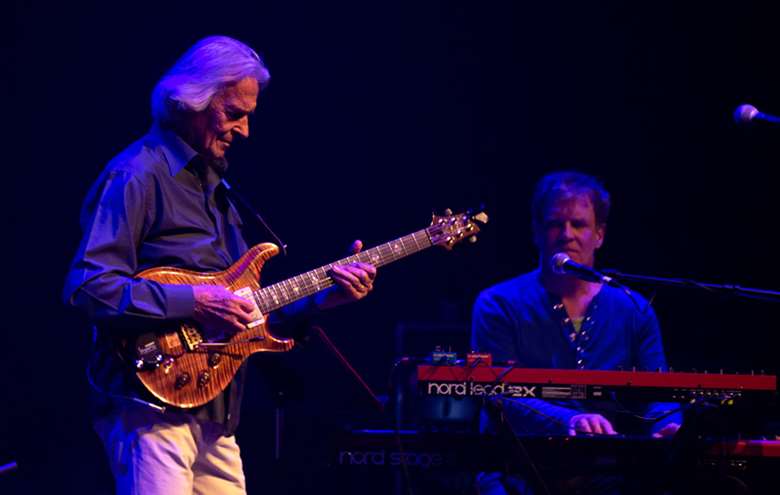Glancing backwards, moving forwards: John McLaughlin & the 4th Dimension @ Barbican Centre
Tuesday, April 30, 2019
Now aged 77, John McLaughlin has a lifetime of intriguing work to revisit.

The master fusioneer’s wide musical travels have incorporated jazz-rock, flamenco, orchestral scores, and extended immersions into Indian classical. Few jazzers have tackled such a broad range of styles with such depth and sincerity, and fewer still have earned acclaim from both stadium crowds and ascetic Hindustani maestros.
But any Barbican attendees hoping for a straightforward retrospective would have missed the point. Colin Harper’s engaging biography of McLaughlin describes him as “the world’s worst nostalgic”, something that should come as no surprise to those who have followed his career - how could anyone prone to nostalgia remain so restless?
So while he led his 4th Dimension group through a few old classics, they were never left as they were. 'Trilogy' opened the evening, but its circling seven-beat riff was slower and thicker than on its original inception as a 1973 Mahavishnu Orchestra jam. Most of the set was drawn from later and comparatively lesser-known works, notably including the odd-time blues of 2012’s 'Echoes From Then' and the world-weary lament of 2015’s 'Gaza City'. He looked beyond his own output too, reworking two Pharoah Sanders compositions ('Light At The Edge Of The World' and 'The Creator Has A Master Plan').
His signature lightning-fast fretwork was less of a centrepiece than in younger days, with dense scale runs often being eschewed in favour of more spacious elaborations. But the fireworks were still there, applied with more than enough aplomb to remind listeners why guitarists from Jeff Beck to Pat Metheny have described him as the instrument’s greatest living exponent.
Some in attendance may have felt that he passed the spotlight over a little too often, however McLaughlin has always been a generous bandleader. The supporting cast warranted it too, wearing their virtuosity lightly and visibly enjoying themselves. Anglo-Indian drummer Ranjit Barot proved himself capable of emulating Billy Cobham’s machine-gun stickwork, augmenting it with spoken bursts of konnakol, South India’s syllabic percussion language. He also took up the mic on Abbaji, a tribute to tabla pioneer Ustad Alla Rakha, singing with a powerful delivery informed by his sideline in Bollywood composition.
Gary Husband manipulated his keyboard solos with tasteful electronic swells, often summoning angular phrases which seemed to owe little to the familiar jazz canon. His intense, studied concentration while hunched over the keys gave way to a wide grin when switching to a second drum kit, showcasing superb dynamic control in a dual-percussion face-off with Barot. Cameroonian bassist Étienne M'Bappé’s black-gloved hands brought a rounded tone to authoritative grooves, enthusiastically thumb-slapping and utilising the Barbican Hall’s smooth low-end resonance to superb effect (although still not quite convincing my dad that basses ever really require a fifth string).
McLaughlin has described the 4th Dimension as being among the very best bands he has ever played with. Their personal camaraderie was on clear display, coming across as warm, supportive collaborators even in moments of frenetic competition. The crowd rose to their feet at the close, relieved rather than surprised that advancing age has not seemed to diminish their hero’s technical ability, drive to reinvent, or talent for forging eclectic groups of musicians into a coherent whole. McLaughlin himself has rarely come across so relaxed, bounding to the stage, dancing with little hesitation, and chanting Pharoah’s mystical refrains with closed eyes. The same searching intensity was there, but the old master might just have seemed more content with what he had found than ever before.
– George Howlett (www.ragajunglism.org)
– Photos by Tatiana Gorilovsky (www.TatianaJazzPhoto.com)